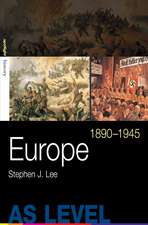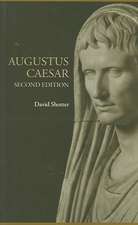The Origins of Post-War German Politics (RLE: German Politics): Routledge Library Editions: German Politics
Autor Barbara Marshallen Limba Engleză Paperback – 28 iun 2016
| Toate formatele și edițiile | Preț | Express |
|---|---|---|
| Paperback (1) | 272.50 lei 43-57 zile | |
| Taylor & Francis – 28 iun 2016 | 272.50 lei 43-57 zile | |
| Hardback (1) | 764.62 lei 43-57 zile | |
| Taylor & Francis – 12 dec 2014 | 764.62 lei 43-57 zile |
Preț: 272.50 lei
Preț vechi: 341.57 lei
-20% Nou
Puncte Express: 409
Preț estimativ în valută:
52.16€ • 56.68$ • 43.84£
52.16€ • 56.68$ • 43.84£
Carte tipărită la comandă
Livrare economică 21 aprilie-05 mai
Preluare comenzi: 021 569.72.76
Specificații
ISBN-13: 9781138839526
ISBN-10: 1138839523
Pagini: 242
Dimensiuni: 156 x 234 x 18 mm
Greutate: 0.45 kg
Ediția:1
Editura: Taylor & Francis
Colecția Routledge
Seria Routledge Library Editions: German Politics
Locul publicării:Oxford, United Kingdom
ISBN-10: 1138839523
Pagini: 242
Dimensiuni: 156 x 234 x 18 mm
Greutate: 0.45 kg
Ediția:1
Editura: Taylor & Francis
Colecția Routledge
Seria Routledge Library Editions: German Politics
Locul publicării:Oxford, United Kingdom
Public țintă
General, Postgraduate, Professional, and UndergraduateCuprins
Introduction. 1. Britain and the Occupation of Germany 2. Local Life under Military government during the ‘Interregnum’: April – August 1945 3. First Political Developments During the ‘Interregnum’ 4. The Democratisation of Local Government 5. The Organisational Framework 6. The Political Parties 7. Conclusions
Descriere
This book discusses how the allies worked towards determining the political future of a defeated Germany. It oulines how the deep ideological divisions within the allied forces ultimately resulted in the division of Germany and discusses how indigenous political movements were impeded by a deeply felt distrust of German nationalism in all organisations. Focusing on the experiences of Hanover, the book illustrates how post-war German politics are the result of a coalescence of distinct and at times even contradictory ideologies and interests, emphasising how the German political scene can only be understood in terms of the mutual interaction of personalities, beliefs and economics and of indigenous and foreign influences.




























